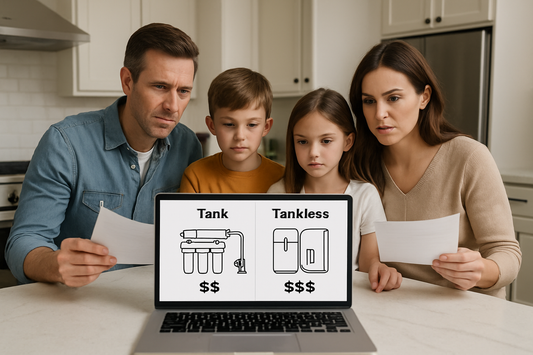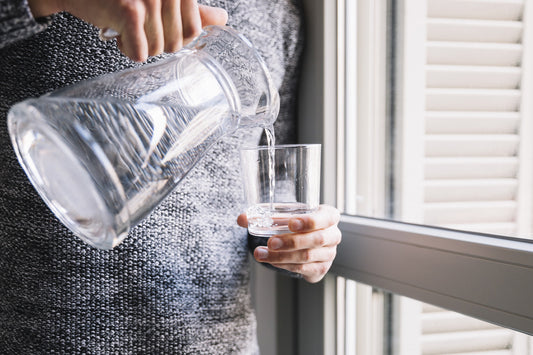Every morning, millions of Americans step into their showers expecting to emerge feeling clean and refreshed. But what if the very water meant to cleanse you is actually working against your skin and hair health? The truth is, your shower water contains chlorine and other chemicals that can leave you feeling dry, itchy, and looking older than your years.
You're not imagining it when your skin feels tight after a shower, or when your hair seems dull despite using expensive products. The culprit hiding in plain sight is your unfiltered shower water, and the solution is simpler than you might think.
The Hidden Truth About Your Shower Water
Municipal water treatment facilities add chlorine to kill harmful bacteria – and that's a good thing. However, this same chlorine that protects you from waterborne illness can wreak havoc on your skin and hair during your daily shower routine.
When you shower in chlorinated water, you're essentially bathing in a mild bleach solution. Chlorine strips away your skin's natural oils, disrupts your hair's protective cuticle, and can even fade color-treated hair faster than normal. For those with sensitive skin conditions like eczema or psoriasis, chlorinated shower water can trigger flare-ups and prolonged irritation.
The warm water and steam in your shower actually make the problem worse. Heat opens your pores and hair cuticles, allowing chlorine to penetrate deeper into your skin and hair shaft. It's no wonder that many people report feeling drier and more irritated after long, hot showers.
How Shower Head Water Filters Transform Your Daily Routine
A shower head water filter acts as your personal water treatment system, removing chlorine and other chemicals before they touch your skin and hair. These compact devices attach directly to your existing shower head or replace it entirely, providing filtered water for every shower.
Modern shower filters use multiple filtration stages. The most effective systems combine activated carbon, which excels at chlorine removal, with KDF (Kinetic Degradation Fluxion) media that tackles heavy metals and bacteria. Some advanced filters also include vitamin C infusion, which neutralizes chlorine while adding skin-nourishing benefits.
The transformation many users experience is remarkable. Within just a few showers, you might notice your skin feels softer and less tight. Your hair may appear shinier and more manageable. Color-treated hair often retains its vibrancy longer, and those with sensitive skin frequently report reduced irritation and redness.

The Science Behind Chlorine Removal Shower Filters
Understanding how chlorine removal shower filters work helps you appreciate their value. Activated carbon, the primary filtration medium, works through a process called adsorption. The carbon's porous surface area attracts and traps chlorine molecules, preventing them from reaching your skin and hair.
KDF media uses a different approach, employing copper and zinc alloys that create an electrochemical reaction. This process not only removes chlorine but also eliminates heavy metals like lead and mercury, while inhibiting bacterial growth within the filter itself.
The most advanced shower filters incorporate vitamin C (ascorbic acid) as a neutralizing agent. When chlorine encounters vitamin C, it's converted into harmless chloride ions. This method is particularly effective in hot water conditions, where traditional carbon filtration may be less efficient.
Installation Made Simple: Your Step-by-Step Guide
One of the biggest advantages of shower head water filters is their user-friendly installation. Most systems require no tools and can be installed in under 10 minutes.
Start by removing your existing shower head by turning it counterclockwise. Clean the threads on your shower arm with a cloth to remove any debris or old plumber's tape. Most shower filters come with rubber gaskets that create a watertight seal, but you can add plumber's tape for extra security.
Thread your new shower filter onto the shower arm, turning clockwise until hand-tight. Avoid over-tightening, which can damage the threads or gaskets. If you're installing a handheld shower filter, you'll typically attach it between your existing shower head and the arm, creating a dual-function system.
Turn on your water and check for leaks. Most quality filters include multiple gasket sizes to ensure compatibility with various shower arm configurations. If you notice any dripping, try adjusting the tightness or switching to a different gasket size.

Image by freepik
Maximizing Your Filter's Performance and Lifespan
To get the most from your chlorine removal shower filter, proper maintenance is essential. Most filters need replacement every 6-12 months, depending on your water quality and usage frequency. A family of four typically falls into the 6-8 month replacement cycle.
Watch for signs that your filter needs changing: reduced water pressure, return of chlorine smell, or skin and hair feeling less soft than usual. Some advanced filters include indicator systems that change color when replacement time approaches.
Regular cleaning of your shower filter housing prevents buildup that can reduce effectiveness. Once monthly, remove the filter and rinse the housing with warm water. For stubborn deposits, a gentle vinegar solution can help dissolve mineral buildup without damaging the filter components.
Consider your local water quality when planning maintenance. Areas with hard water or high chlorine levels may require more frequent filter changes. Contact your water utility for a water quality report, or use home testing kits to understand your specific filtration needs.
Real Results: What Users Experience
The benefits of shower head water filters extend beyond just removing chlorine. Users consistently report softer skin that requires less moisturizing, shinier hair that's easier to style, and reduced irritation from sensitive skin conditions.
Color-treated hair maintains its vibrancy significantly longer when washed with filtered water. Many users find they can reduce their hair washing frequency because their hair doesn't become as oily or weighed down by chemical residue.
Those with children often notice the most dramatic improvements. Kids with eczema or sensitive skin frequently experience fewer flare-ups when bathing in filtered water. The gentle, chemical-free water is particularly beneficial for babies and toddlers with delicate skin.
Choosing the Right Shower Filter for Your Needs
Not all shower filters are created equal. When selecting a system, consider your primary concerns: is chlorine removal your main goal, or do you need broader filtration including heavy metals and bacteria?
For most households, a combination carbon and KDF filter provides excellent chlorine removal while addressing other common water quality issues. If you have particularly sensitive skin or severe reactions to chlorinated water, look for filters that include vitamin C neutralization.
Consider your shower setup as well. Standard shower heads work with most filters, but low-flow or specialty shower heads may require specific adapter types. Handheld shower filters offer flexibility but may have shorter lifespans due to increased handling.

Image by freepik
The Environmental and Economic Benefits
Investing in a shower head water filter delivers benefits beyond personal health. By improving your water quality at the source, you may find yourself using fewer skin and hair products, saving money on moisturizers, conditioners, and specialty treatments.
The environmental impact is equally positive. Reduced reliance on bottled water for drinking and cooking, combined with longer-lasting hair color and reduced product consumption, contributes to a smaller environmental footprint.
Quality shower filters typically cost less than two months' worth of premium skin and hair products, making them an economical choice for health-conscious families.
Frequently Asked Questions
How often should I replace my shower filter cartridge?
Most shower filters need replacement every 6-12 months, depending on water quality and usage. A family of four typically needs replacement every 6-8 months for optimal performance.
Will a shower filter reduce my water pressure?
Quality shower filters should maintain good water pressure. If you notice significant pressure reduction, it may indicate a clogged filter that needs replacement or cleaning.
Can shower filters remove all chlorine from my water?
Yes, properly functioning shower filters can remove 90-99% of chlorine from your shower water, providing significant benefits for skin and hair health.
Are shower filters compatible with all shower heads?
Most shower filters are designed for standard shower connections. However, specialty or low-flow shower heads may require specific adapters or alternative installation methods.
Do shower filters help with hard water issues?
While shower filters excel at chlorine removal, they provide limited help with hard water minerals. For comprehensive hard water treatment, consider a whole-house water softening system.





